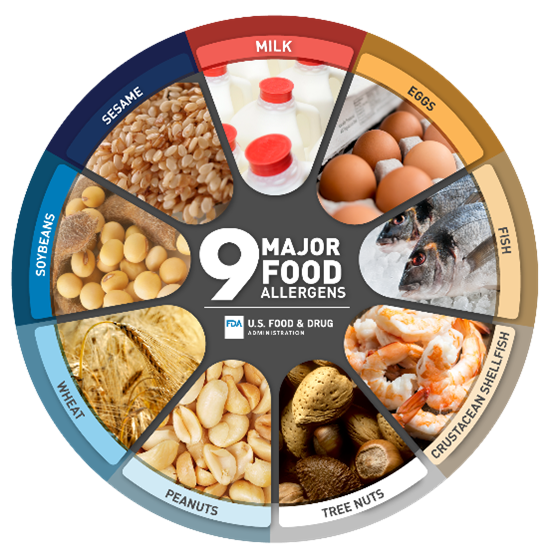Consumers rely heavily on food labeling to inform them of the ingredients within a product, whether it be for nutritional information or, perhaps more importantly, for food allergen information. As such, food and beverage manufacturers must stay up to date on the latest food allergen regulations.
In April, 2021, President Biden signed into law the Food Allergy Safety, Treatment, Education and Research (FASTER) Act, which amended the Food Allergen Labeling and Consumer Protection Act (FALCPA) of 2004. The amendment added sesame as the ninth major food allergen.
FALCPA and FASTER help protect consumers with severe food allergies or sensitivities by requiring companies to disclose if any of the nine major food allergens – milk, eggs, fish, shellfish, tree nuts, peanuts, wheat, soybeans, and sesame (as of January 1, 2023) – are present in a product’s ingredients. If so, those allergens must be clearly marked on the product packaging.
The FASTER Act also mandates that the Department of Health and Human Services must report on certain information related to food allergy research and data collection – a significant step for food allergen research – within the next 18 months. The research could have major impacts on future consumer food trends, but for now, what do businesses need to know?
Sesame as a Major Food Allergen
In recent years, data has shown that sesame is now a relatively common food allergen, affecting an estimated 1.5 million children and adults in the U.S. Sesame is commonly found in baked goods, sauces and dressings, hummus, as well as in many Asian and Middle Easter cuisines.
Previously, consumers with a sesame allergy may have struggled to identify the presence of the allergen as some manufacturers would list the ingredient under alternative names, such as tahini. Additionally, sesame is often used in proprietary flavors or spice blends, which may be listed as “natural flavors” or “natural spices” in the ingredient list. Now, manufacturers will need to declare any potential cross contamination along the production line, as well as any potential hidden sources. The addition of sesame as a major food allergen is a huge win for those with a severe allergy or sensitivity to the ingredient.
FAQs for Food Allergen Regulations
As businesses adjust to the latest food allergen regulations, the FDA recommends that consumers pay close attention to their food products, particularly ones that were distributed prior to 2023.
Businesses, however, will need to evaluate if any of their recipes contain sesame or other allergens and perform due diligence to contact suppliers if there are any unclear ingredients. Below, we answer a few questions to help food manufacturers better understand food allergen regulations:
What are the nine major food allergens as of January 1, 2023?
The nine major food allergens are milk, eggs, fish, shellfish, tree nuts, peanuts, wheat, soybeans, and sesame.

What’s different about sesame labeling requirements in 2023?
As a major food allergen, sesame must now be listed specifically on a food label as “sesame,” and not just part of another ingredient, such as “spice mix.” (Ex: “natural spices (sesame) and spice mix (sesame)”). This is also true for any food packages with “contains” statements – sesame must be listed clearly as an ingredient under any food that contains it (ex: “Contains Wheat, Sesame”).
What happens if food labels don’t declare sesame or other allergens?
Labeling errors or mislabeled allergens will result in the food manufacturer or FDA having to declare a food recall. According to the FDA, allergen issues are one of the leading causes of food recalls, which can have major impacts across the entire supply chain. The best way to avoid mislabeled allergens is to use food labeling and formulation software that automatically declares allergens when ingredients are entered into the system.
How can businesses perform due diligence and reduce the chance of undeclared allergens?
There are a few steps businesses can take to reduce the chance of allergens making it into their food products. Here are some tips:
- Conduct a thorough review of your ingredients. If any ingredients from suppliers are unclear (such as having “spice mix” but no list of what spices that includes), then contact your supplier to get more information on their ingredients. As an added precaution, you can also conduct regular allergen testing on your food products.
- If you run an allergen-free facility, communicate with your suppliers the importance of preventing cross-contamination, mislabeled allergens, and other precautions you may have in place.
- Train employees on allergen awareness and to follow good manufacturing practices and sanitation standard operating procedures (SSOPs) to clean equipment and avoid cross-contamination between production cycles.
- Keep and maintain accurate records of ingredient sources, supplier communication, production procedures, and any relevant allergen testing results. (This will also be important for FSMA 204 compliance – learn more about that with our free FSMA 204 consult.)
- Review labels and packaging to ensure allergen information is accurate and properly labeled. We offer a quick walkthrough on how to add sesame allergen declarations in Genesis R&D Foods.
- Aim for continuous improvement by evaluating procedures, conducting allergen tests, and monitoring results.
Navigating Food Allergen Regulations with Genesis R&D Foods
With ever-changing government regulations and the latest updates to food allergen regulations, it is essential that businesses are equipped with the right tools to ensure compliance. The Genesis Foods formulation and labeling software is a powerful tool that can help organizations create regulatory-compliant nutrition facts labels and produce ingredient and allergen statements – among other benefits – to help businesses stay ahead of the game.
Contact our team at Trustwell today to learn more about how Genesis Foods can help you navigate food allergen regulations in 2023 and beyond.
Other posts you might be interested in
View All Posts
Food Labeling
23 min read
| March 17, 2020
FDA Allergen Statement Labeling: Synonyms, Species, and Types
Read More
Product Formulation
12 min read
| June 21, 2023
How to Create Accurate Allergen Declarations and Ingredient Statements with Genesis Foods
Read More
Food Labeling
12 min read
| March 15, 2023

